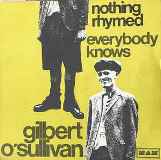
In 1984, Bob Geldof was watching Michael Buerk on the BBC news talking about and showing images of the famine in Ethiopia which moved him so much that it prompted him to write Do They Know It’s Christmas, which, in turn, led to Live Aid. The record became the biggest selling single ever in the UK, a record it held until 1997. However, 14 years before that Raymond O’Sullivan had been inspired by the same type of story.
Ray was born in Waterford, Ireland in December 1946 and when he was seven the family moved to Battersea, south London but they didn’t stay there long either, the following year they moved again, this time to Swindon. He attended Swindon Art College and was briefly a member of Rick’s Blues where he played drums. The Rick being Rick Davies, who taught Ray to play keyboards and drums and later went on to form Supertramp.
Ray said, “In Swindon I was sending songs to London but getting no response. London was the centre of it all, it was the place to be, so I moved there in 1967. I got a flat with some friends and looked to getting a deal. I just had that self-belief. I didn’t need people to tell me I was any good. I knew I was. I had songs I believed in. It was very important to have that as it took three years.” He was briefly signed by Stephen Shane to April music as a songwriter, Shane suggested he change his first name to Gilbert as a play on words based on the opera composers Gilbert & Sullivan. He released two singles, Disappear and What Can I Do? of which neither troubled the record buyers. He then signed a deal with Major Minor and released a great track called Mr. Moody’s Garden that went nowhere either. He sent some demo material to Tom Jones’ and Engelbert Humperdinck’s manager Gordon Mills who liked the songs. “Then I met Gordon and it started to take off. There are a lot of talented people out there, but who lack self-belief, but self-belief is what gets you through the day and gives you the discipline which is your validation. The five days a week you spend writing is justified.” Gordon then signed him to his own MAM record label. “He signed two artists at the same time; me and Dave Edmunds. In November 1970, Dave had a Number one with I Hear You Knocking and a few weeks later I had a hit with Nothing Rhymed. In Ireland it was a huge deal for me as I was a Waterford boy having success in England. Mind you, they went off me pretty quickly, but I won them back, they came back to me!”
“When Gordon took me on as a manager,”, Gilbert continued, “I hadn’t written Nothing Rhymed but, by the time we got into the studio, ’69 or early ’70 it was a magic session to be in there with top musicians. If it had not been released and never been a hit, I would have been so happy to have made a record that I was really proud of and it had that lovely bass intro by Herbie Flowers.” Herbie does that BOOM at the start of the song.
Gilbert explained in an interview with Jason Barnard how he came to write the song. “It was inspired by the first time that there’d been starving children shown on television and it really resonated with everybody who watched it. As a lyric writer I just write about what I read in the newspaper and what I see on television; I’m a good observer, so I incorporate all sorts of things that I see going on around me, which I like because it means that I’m not just sticking with the one subject. And songs like Nothing Rhymed are about the sort of things that you very often read about, the horror and the violence that goes on in the world, the starving, those issues are the day-to-day things which very often interest me as a lyricist.”
Mills suggested that Nothing Rhymed should be the debut single and it was released on the last week of October 1970. Three weeks later it peaked at number eight in the UK, number two in his native Ireland and topped the chart in the Netherlands.
A number of people have covered the song, firstly Tom Jones on his 1971 album She’s A Lady, later the same year, the Italian group I Profeti covered it with new Italian lyrics, Yvonne Elliman included it on her debut album in 1972 and Morrissey very often includes a cover in his live shows.
Gilbert had a five-year hiatus in the mid-seventies to deal with legal matters involving royalties he never received from Gordon Mills which was eventually resolved in 1982 with a court awarding Gilbert £7 million in damages.
He is still recording and just three months ago released his 19th studio album, Gilbert O’Sullivan which entered the chart at number 20 and giving him his first album entry of new material for almost 42 years.